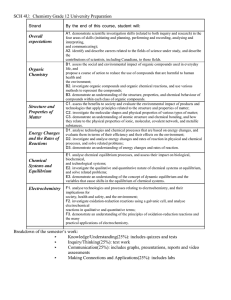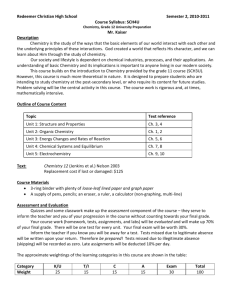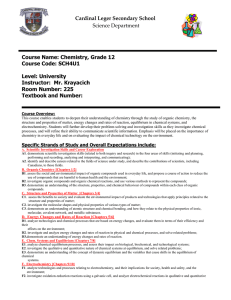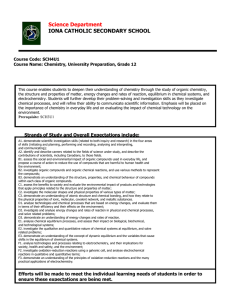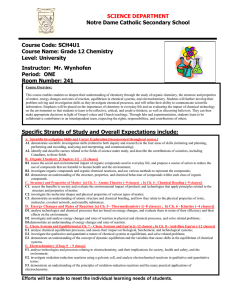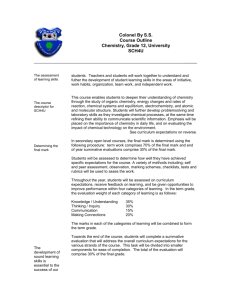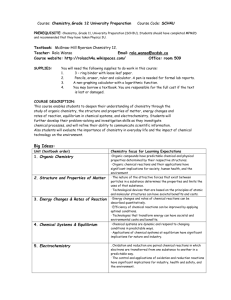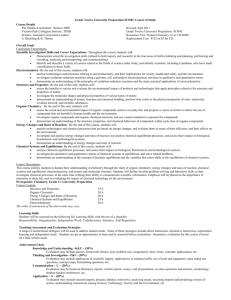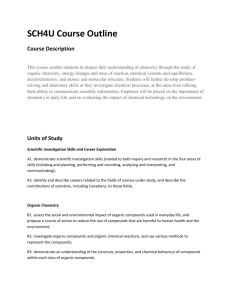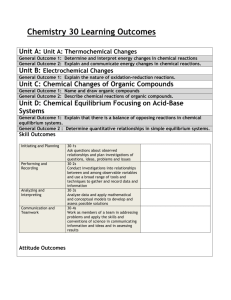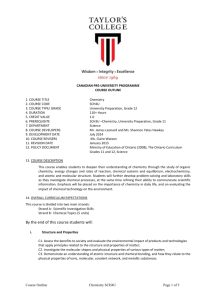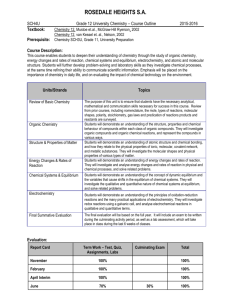2012 fall course outlines SCH4U
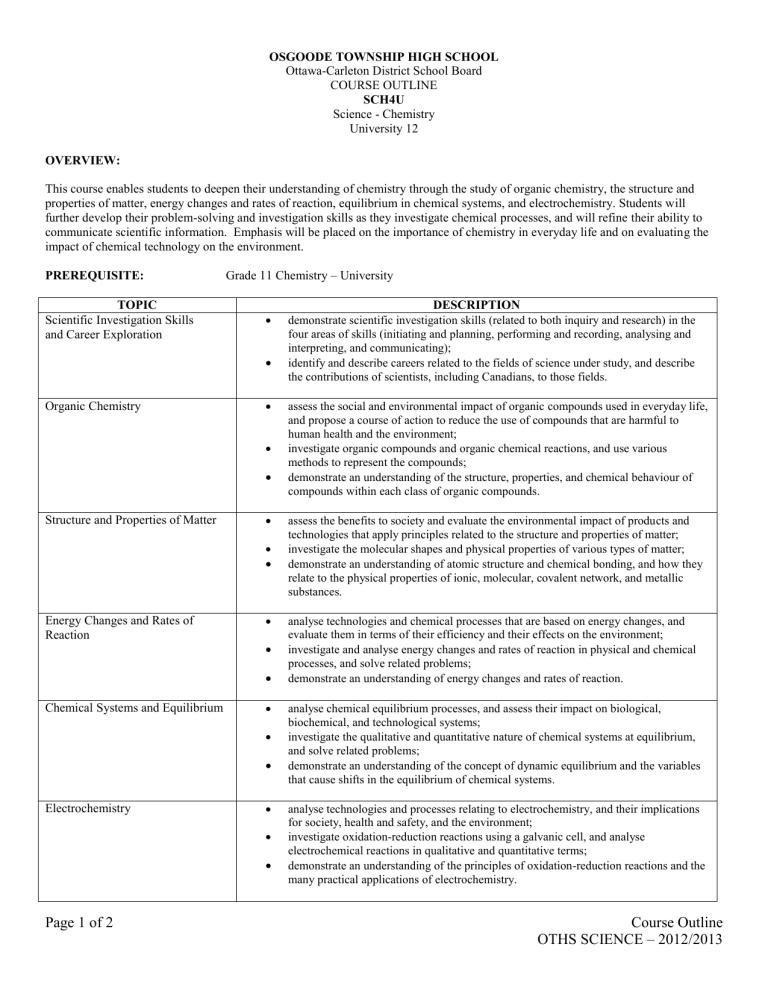
OSGOODE TOWNSHIP HIGH SCHOOL
Ottawa-Carleton District School Board
COURSE OUTLINE
SCH4U
Science - Chemistry
University 12
OVERVIEW:
This course enables students to deepen their understanding of chemistry through the study of organic chemistry, the structure and properties of matter, energy changes and rates of reaction, equilibrium in chemical systems, and electrochemistry. Students will further develop their problem-solving and investigation skills as they investigate chemical processes, and will refine their ability to communicate scientific information. Emphasis will be placed on the importance of chemistry in everyday life and on evaluating the impact of chemical technology on the environment.
PREREQUISITE: Grade 11 Chemistry – University
TOPIC
Scientific Investigation Skills and Career Exploration
DESCRIPTION
demonstrate scientific investigation skills (related to both inquiry and research) in the four areas of skills (initiating and planning, performing and recording, analysing and interpreting, and communicating);
identify and describe careers related to the fields of science under study, and describe the contributions of scientists, including Canadians, to those fields.
Organic Chemistry
assess the social and environmental impact of organic compounds used in everyday life, and propose a course of action to reduce the use of compounds that are harmful to human health and the environment;
investigate organic compounds and organic chemical reactions, and use various methods to represent the compounds;
demonstrate an understanding of the structure, properties, and chemical behaviour of compounds within each class of organic compounds.
Structure and Properties of Matter
assess the benefits to society and evaluate the environmental impact of products and technologies that apply principles related to the structure and properties of matter;
investigate the molecular shapes and physical properties of various types of matter;
demonstrate an understanding of atomic structure and chemical bonding, and how they relate to the physical properties of ionic, molecular, covalent network, and metallic substances.
Energy Changes and Rates of
Reaction
analyse technologies and chemical processes that are based on energy changes, and evaluate them in terms of their efficiency and their effects on the environment;
investigate and analyse energy changes and rates of reaction in physical and chemical processes, and solve related problems;
demonstrate an understanding of energy changes and rates of reaction.
Chemical Systems and Equilibrium analyse chemical equilibrium processes, and assess their impact on biological, biochemical, and technological systems;
investigate the qualitative and quantitative nature of chemical systems at equilibrium, and solve related problems;
demonstrate an understanding of the concept of dynamic equilibrium and the variables that cause shifts in the equilibrium of chemical systems.
Electrochemistry
analyse technologies and processes relating to electrochemistry, and their implications for society, health and safety, and the environment;
investigate oxidation-reduction reactions using a galvanic cell, and analyse electrochemical reactions in qualitative and quantitative terms;
demonstrate an understanding of the principles of oxidation-reduction reactions and the many practical applications of electrochemistry.
Page 1 of 2 Course Outline
OTHS SCIENCE – 2012/2013
EVALUATION:
TERM
Categories for each assessment tool including approximate percentages.
Knowledge & Understanding
Thinking
Communication assessment tasks.
40%
Application 15%
30%
15%
100%
Assessment tools include tests/quizzes, assignments, performance tasks and rich
FINAL
Term Work
Summative Task *
Final Exam **
70%
10%
20%
100%
May include independent study unit,
portfolio, performance tasks, etc…
** will evaluate whole semester’s work
ACCOMODATIONS:
The Science department makes every effort to accommodate the identified needs of exceptional students and will attempt to differentiate curriculum delivery methods, student modes of expression, and assessment methods as recommended by the student’s individual education plan (IEP)
REQUIRED MATERIALS:
It is recommended that students have a science only three ring binder (coil notebooks are unacceptable), lined paper, graph paper, pencils, erasers, ruler and a scientific calculator.
OTHER:
Please see Student Planner for policies on punctuality, absenteeism, examinations, academic fraud, and other student responsibilities.
The Big Ideas
Organic Chemistry
Organic compounds have predictable chemical and physical properties determined by their respective structures.
Organic chemical reactions and their applications have significant implications for society, human health, and the environment.
Structure and Properties of Matter
The nature of the attractive forces that exist between particles in a substance determines the properties and limits the uses of that substance. Technological devices that are based on the principles of atomic and molecular structures can have societal benefits and costs.
Energy Changes and Rates of Reaction
Energy changes and rates of chemical reactions can be described quantitatively. Efficiency of chemical reactions can be improved by applying optimal conditions. Technologies that transform energy can have societal and environmental costs and benefits.
Chemical Systems and Equilibrium
Chemical systems are dynamic and respond to changing conditions in predictable ways. Applications of chemical systems at equilibrium have significant implications for nature and industry.
Electrochemistry
Oxidation and reduction are paired chemical reactions in which electrons are transferred from one substance to another in a predictable way. The control and applications of oxidation and reduction reactions have significant implications for industry, health and safety, and the environment.
